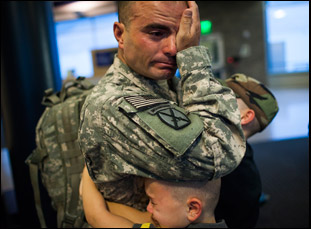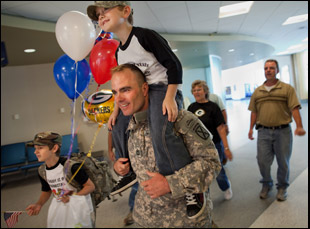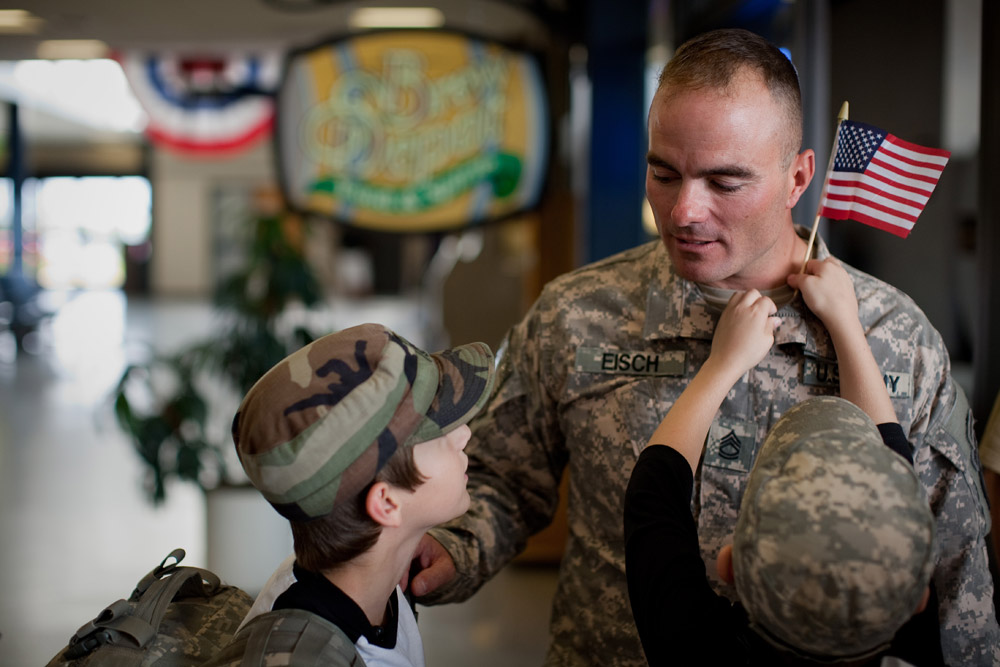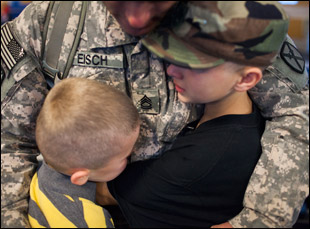There’s an extraordinary shot early in Catrin Einhorn and Leslye Davis’ “Father Soldier Son” as a tightly packed U.S. military plane headed for Kunduz, Afghanistan can be seen from the inside, with dozens upon dozens of soldiers viewed clearly from overhead to observe them collectively looking towards an uncertain future while being totally consumed by what they know for sure they are leaving behind from the lives they lead at home. Einhorn knew of the scene from her work at the New York Times, where she was part of the team of journalists who spent a year following the First Battalion, 87th Infantry of the 10th Mountain Division as they went into combat.
“Our military affairs correspondent at the time [James Dao] was in very close contact with that battalion and its commander and he got permission for himself and a photographer [Damond Winter] who also shot that beautiful video to make several trips to Afghanistan,” says Einhorn, who couldn’t have known at the time that the series was only the start of what would be nearly a decade-long pursuit.
Although “Father Soldier Son” recognizes that any one of the men and women on that plane surely had a story to tell, Einhorn was drawn to Brian Eisch and his two young sons Isaac and Joey, who he put in his uncle’s care while he was away at war, and following a feature in the Times and a subsequent multimedia piece about the family in 2010, she kept in touch. A few years later, she and Davis, a colleague at the paper with a shared interest in filmmaking, would find themselves at the bedside of Eisch in Laconia, New York where the 17-year veteran was looking at a premature end to his tour of duty when an injury to his leg that had been occurred in service deteriorated to the point of amputation, and with a new prosthetic comes a new life for Eisch while his sons wonder whether they’ll see the same old dad again.
It creates a fascinating dynamic that Einhorn and Davis watch unfold over the course of many years as Isaac and Joey grow up, following in the footsteps of their father in some ways — both take up wrestling at school as Brian once did – but diverge in others (and from each other) when asked if they’ll join the military as Brian did and his father before him. Threading the needle between respecting the armed forces and asking what are they defending in this day and age as families like the Eisches may feel no other opportunities are available domestically for a sustainable life besides enlisting, the film shows the sacrifice that Eisch has made for his country goes beyond the physical ailment he sustained when his identity as a soldier is taken away from him and he confronts a future not knowing where he fits into others’ lives while his sons who have been deprived of having a father around already can feel as if they’ve lost him again, even when he’s back at home. With the film now available on Netflix, Einhorn and Davis spoke about putting in the time to tell such a story properly and capturing how influence takes shape during Isaac and Joey’s formative years.
Catrin Einhorn: He was one of many soldiers we profiled during this initial series that we’d started in 2010, but his boys Isaac and Joey were just so captivating. and they just really grabbed onto us, so after we had met them and spent time with them over the course of the initial reporting, when we learned Brian went back to Afghanistan a couple months [later] and gotten wounded and that he was going to have his leg amputated, we knew we had to be there.
Leslye Davis: I met Brian the morning he was having his leg amputated, so I was really just thrown into the mix. Then Cat and I were just figuring out together what this was going to be. What this project ultimately looked like evolved over time as we continued to shoot because things continued to happen with the family.
Brian becomes clearly frustrated with life after the amputation. Was he always accessible?
Catrin Einhorn: He was. Brian is really open and I think he finds meaning in sharing his life and what’s happening to him, so when I called him up and asked him if we could be there for the surgery, he didn’t hesitate. Convincing the VA to let us in was a little harder, but they did let us in. [laughs]
Did the idea automatically lend itself to taking your time with it?
Leslye Davis: At the beginning, we knew we wanted to invest some time with this family because we wanted to see the boys grow up, especially when at the age they were in 2014 when we went back. They were changing a lot really quickly month-to-month, day-to-day — the way that they thought and felt and expressed themselves, how deep their voices were and how much hair they had on their little chins, so it was really interesting to watch how much they’d change really quickly over a short period of time and then eventually a long period of time. We certainly never thought we’d spend this long. We went in directions we weren’t planning for both with really happy and exciting things happening in the family’s life and also with really horribly difficult, tragic things, so we did watch the family evolve with how they dealt with that and also evolved what we were making around their experiences.
Catrin Einhorn: The themes just really deepened over time. And also broadened in that in some ways they became more universal. Initially, we were looking at what is the cost of war on these little boys and how is the soldier’s deployment affecting this family? But over time, as we saw other dynamics emerge in their relationships, life just kept happening to them, so these deeper themes emerged.

Leslye Davis: Yeah, I’m pretty sure that we learned that Isaac had made that departure in that scene where they’re fighting in the truck, so that did surprise us, but at the same time it didn’t because Isaac was reflective of what he had seen his father go through and not being sure that the injuries that he dealt with and the way that changed his life was worth it. He also was pretty in touch with his own feelings about what it was like going through that as a kid as a result of your parent deciding to make this commitment to their country.
What I thought was wonderful about this is when it’s a story about expectations, you only gradually reveal Brian’s history, from his wrestling to the family’s overall connection to the military, so you can feel the weight of it. Was it a challenge structurally to figure out how best to parse that information out so it wasn’t all upfront?
Catrin Einhorn: We played with it for many months because there’s so much plot in there. So many things happened that figuring out how to explain some of the thematic stuff became a really creatively engaging and exciting part of putting the film together. The themes were very obvious in the interviews with the family story, but how to sprinkle them in was what was fun to figure out.
Leslye Davis: We loved our editor Amy Foote and we also had an incredible consulting editor Jeff Richmond, and a brilliant team of [assistant editors].

Leslye Davis: That was the question for a long time because again, things just kept happening in their lives. Some of the things that evolved and unfolded when we were thought we were almost done, it would’ve been impossible for us to stop following this thread of the story, so if you watch the film, I think you can actually feel there are many moments where we could’ve ended it there if we wanted to, but I think the commitment to not stopping and continuing to try and explore those curiosities and answer questions made it a much more special story.
Catrin Einhorn: And time is what reveals things, so [the fact] that we stuck with it really allowed us to tell a more powerful and true story.
“Father Soldier Son” is now streaming on Netflix.





